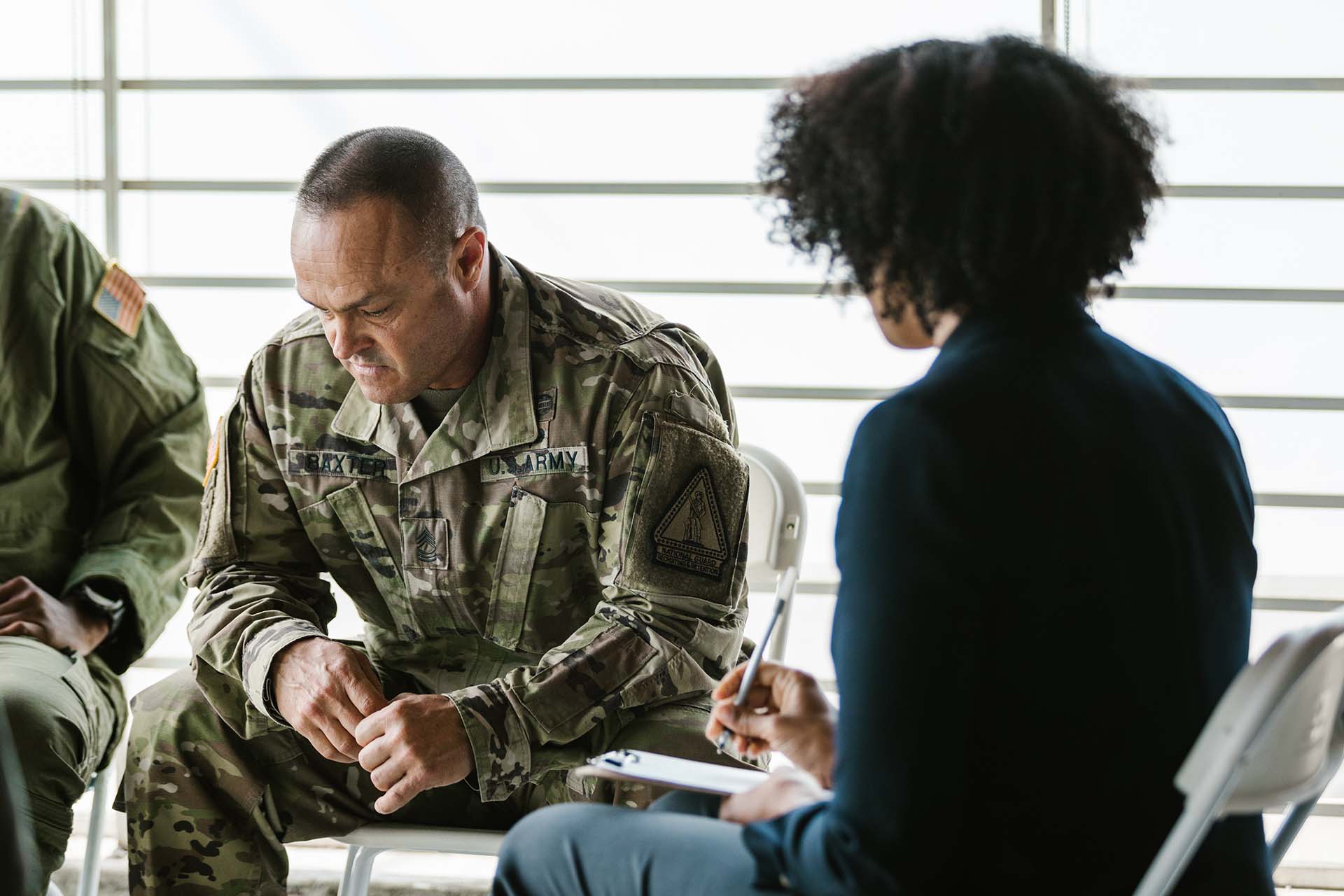Our nation’s heroes, those who have selflessly served their country, are not immune to the challenges of mental health. This comprehensive guide aims to shed light on the silent struggle of depression among veterans, offering a path toward healing and reclaiming mental well-being.
Understanding the Impact of Trauma on Veterans’ Mental Health:
The experiences of veterans often involve exposure to traumatic events, leaving an indelible mark on their emotional well-being. These experiences can contribute to the development of mood disorders, including major depression. Recognizing the connection between traumatic experiences and depression is crucial for providing effective support and treatment to veterans.
Importance of Face-to-Face Mental Health Services for Veterans:
While various mental health support options exist, face-to-face mental health services play a pivotal role in addressing depression among veterans. These services offer a secure, confidential space for veterans to express their emotions, discuss their struggles, and receive personalized care. Through these interactions, mental health professionals can better assess veterans’ needs and tailor treatment plans accordingly.
Seeking Specialized PTSD Counseling for Veterans’ Healing:
Post-traumatic stress disorder (PTSD) is a common condition among veterans and often coexists with depression. Seeking specialized PTSD counseling is essential for veterans to process traumatic experiences and develop effective coping strategies. Addressing both PTSD and depression concurrently leads to significant improvements in veterans’ mental health and overall well-being.
Differentiating Mood Disorders from Personality Disorders:
Distinguishing between mood disorders, such as major depression, and personality disorders is critical when addressing depression among veterans. Mood disorders involve recurrent depressive episodes significantly affecting emotional states, while personality disorders encompass enduring behavior patterns. Understanding this distinction guides appropriate treatment options for veterans.
Cognitive Behavioral Therapy (CBT): Empowering Veterans to Manage Depression:
Cognitive behavioral therapy (CBT) is a widely recognized and effective approach for managing depression. CBT focuses on identifying and altering negative thought patterns and behaviors contributing to depression. This empowers veterans to regain control over their emotional well-being, equipping them with valuable skills for managing mood swings and building resilience.
Transcranial Magnetic Stimulation (TMS) Therapy: A Promising Treatment Option:
Transcranial magnetic stimulation (TMS) therapy is a non-invasive procedure that uses magnetic fields to stimulate specific brain areas associated with depression. This treatment has shown promise in reducing depressive symptoms, even in cases where traditional treatments were ineffective. TMS therapy is particularly beneficial for veterans who have tried various options without significant improvement, offering an additional effective tool in the battle against depression.
Addressing Stigma and Fostering Open Dialogue:
The stigma surrounding mental health issues can be particularly strong within the veteran community. It’s crucial to address this stigma head-on, encouraging open dialogue and normalizing seeking help for depression. Veterans should feel empowered to discuss their mental health challenges without fear of judgment or shame.
Preventative Measures for Maintaining Mental Well-being:
In addition to seeking professional treatment, veterans can adopt preventative measures to maintain their mental well-being and reduce the risk of depression. These measures include stress management techniques, maintaining a healthy lifestyle, and building strong social connections and support networks.
Promoting Community Support and Peer Networks:
The power of community support cannot be underestimated in the journey towards overcoming depression. Veterans should be encouraged to connect with others who understand their experiences and can offer empathy and guidance.
Expanding Resource Accessibility for Veterans Nationwide:
Providing a comprehensive list of resources, including national hotlines, online resources, and local support organizations, ensures that veterans across the country can access the help they need.
FAQ Section:
Q1: How common is depression among veterans?
Depression is prevalent among veterans, with research showing that up to 20% of veterans may experience symptoms of depression. However, it’s essential to note that these symptoms vary in severity, and early intervention can lead to effective management.
Q2: Are there specific signs of depression in veterans to watch out for?
Yes, some common signs of depression in veterans include persistent sadness, loss of interest in activities, changes in sleep and appetite, feelings of hopelessness, and social withdrawal. It’s crucial to seek help if you notice these signs.
Q3: Can depression and PTSD coexist in veterans?
Q4: How can veterans access face-to-face mental health services?
Veterans can access face-to-face mental health services through the Department of Veterans Affairs (VA) or by seeking care from private mental health professionals who specialize in treating veterans.
Q5: What are some self-help strategies veterans can use to manage depression?
Veterans can manage depression by practicing stress management techniques, maintaining a healthy lifestyle through exercise and nutrition, and seeking social support from fellow veterans and loved ones.
Q6: How can veterans overcome the stigma surrounding mental health?
A6: Overcoming stigma involves open conversations about mental health, raising awareness, and seeking support from mental health professionals and support groups. It takes courage, but it’s a crucial step in the healing process.
Conclusion:
Depression is not a sign of weakness, but a challenge that can be overcome with the right support and treatment. Veterans, you are not alone. There is hope, and taking the first step toward seeking help can make all the difference.
DiscoveryMD: Your Partner in Mental Health Care:
If you or a veteran you know is struggling with depression, DiscoveryMD is here to provide comprehensive mental health care and support. Our team of experienced psychiatrists and mental health professionals is dedicated to helping veterans reclaim their well-being and live fulfilling lives.
Remember, you have served your country with courage and honor. Now, it’s time to prioritize your mental health and reclaim your well-being. The path to healing may not be easy, but with the right resources, support, and unwavering determination, you can overcome depression and rediscover the strength and resilience that define you.
